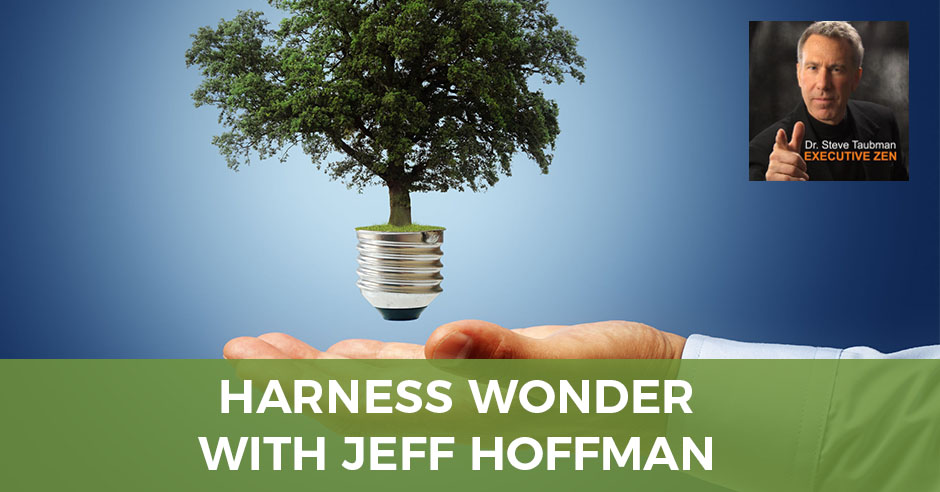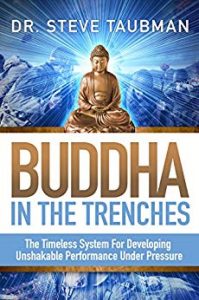

In this episode, I have the delight to interview a friend, a co-author, and a remarkable business legend, Jeff Hoffman, who has been responsible for taking several companies from zero to multiple billions in valuation, and is an advisor the the president’s office on business and entrepreneurship.
Recently, the Dalai Lama told Jeff that if he wants to change the world, he should “Forget today’s leaders. Focus on the youth!” So, Jeff has been empowering youth worldwide to use their innovation to solve global problems.
Here, Jeff and I talk about wonder, the topic of a book we’re writing (albeit WAY too slowly) 🙂
—
Listen to the podcast here:
Harness Wonder with Jeff Hoffman
I’m excited about our topic, which is the power of wonder. Our guest is Jeff Hoffman, who is the perfect person for this topic. I wanted to share this with you because it’s been an interesting journey topic for me. I was writing a speech which I thought was going to be about happiness. The more I crafted it and considered my message, the clearer it became that what I’d stumbled on was a new topic, something related to happiness, but separate from it in many ways. What I’ve found was that I had a strong inclination to talk about wonder. I realized that my life had prepared me maybe more completely than anything else for that discussion. Wonder was my field of expertise, or at least I found that out after considering it. Once I did, I started reflecting on my life and what I had accomplished.
I looked at my various contributions through that lens, through the lens of wonder, and I started seeing things that made a lot of sense. It became very clear about what I was here on the planet to share. The next thing that I did was to start reflecting back over my life and looking at some stories that exemplify this idea of wonder. The first story that came to me is a very early childhood memory. When I speak about this on stage, I’ll usually embellish it with some jokes and humor. I’ll say August 9, 1963, six months to the day before the Beatles came to America and changed music and culture forever, something even more monumental occurred. I’ll ask the audience if anybody knows what it was. People have all kinds of historical references. I’ll say, “No, that’s the day that my parents brought me and my sister to a motel for the very first time.”
At the time I was seven years old. My sister was four, although she would be known to say, “I’m four and three quarters,” and my seven-year-old brain would think, “She’s so immature.” I remember this day vividly. We were vacationing upstate New York and we were standing in front of this little green bungalow that was about to be our new home for the next couple nights. My sister and I, we’re beyond excited. I can’t remember ever having been that thrilled about anything in my life before or since. It was this jumping out of your skin enthusiasm. We waited for my father to open the door and he seemed to do it in slow motion. Everything was just dragging until that door finally swung open. When it did, my sister and I exploded into the room and experienced the greatest sense of joy in our lives.
The first thing we noticed and I’m not making this up. There were two beds in one room. It was so remarkable to us. We’d never seen anything like that. While my parents unpacked the car, my sister and I jumped from one bed to the other, counting as accurately as any four and seven-year-old can who could get more bounces. My sister was so immature that she started to cry when she hit a million bounces and found out that I’d already hit a billion. We continued our explorations in an effort to calm her and have some fun. We found little doll soaps in the bathroom and the giant pool and the big fluffy pillows. The most amazing thing of all was the toilet in the bathroom was dressed like Miss America. It had a sash seal for your protection. We were amazed by that and everything else that came before and since.
How quickly does the magic disappear when wonder and appreciation give way to the demands and expectations of the world. Click To TweetWe spent a few nights there. We went on to visit other hotels and about three weeks later at the end of the vacation we were in our last hotel room and my sister and I had an entirely different view of things. We walked in and her arms were folded and our faces were scrunched and we began our litany of complaints. The bed’s too hard, the pillows are too soft, the soap’s too big. The pool is too small. The toilet, of course, was not dressed like Miss America. We were pretty upset about that. I thought about how quickly wonder and appreciation give way to demands and expectations and just like that the magic disappears.
As I think about that, I wonder what do we lose when we lose the ability to experience wonder? What do we give up when we become very adult-like and very rigid in our thinking very mature and so cool? We’ve seen it all, we’ve done it all. Maybe we see advantages in that mentality, but what do we lose? What are we missing when we’re not able to access our childlike nature when we can’t be creative and innovative, enthusiastic and awestruck by life? As it turns out, we lose a great deal. As leaders, as executives, as potential innovators in your company, you may want to start considering what the cost is to be too adult-like to be too sure of yourself. To be too ingrained in a certain way of thinking. Those who are able to access that childlike nature, display certain very predictable and wonderful attributes. They tend to work harder.
They tend to go along or with fewer difficulties. They tend to be more innovative. They tend to be better communicators and to influence others in a more positive way. They tend to be capable of coming up with fun ideas that can be marketable and can be brought to market. These are the things that I’ve been exploring. In the process of exploring them, I did a lot of research on this idea of wonder from a variety of angles here through a psychology and spirituality, mindfulness, and business itself. There are a lot of studies that have come of this. There are some interesting studies about how being exposed to even a few moments of awe and wonder can produce increased effectiveness in a variety of ways.
I started writing this book, The Power of Wonder. I wrote about a chapter of that. I started thinking before I take this thing too far, I ought to find out if there’s anybody else who’s already written a book by that title. I went on online and I Googled the power of wonder. Lo and behold, I came up with a TED Talk by a gentleman by the name of Jeff Hoffman. I tuned into it. I didn’t want to watch the whole thing because I didn’t want it to influence my process, but I wanted to see what this guy was all about. At the time, I knew nothing about him. All I knew was what I saw in that first five minutes of his video. I was absolutely delighted he was talking about wonder in a way that spoke to the business world to leaders and entrepreneurs.

Buddha In The Trenches: The Timeless System For Developing Unshakable Performance Under Pressure
It overlapped what I was saying, but not so much that it was the same thing. I felt compelled to continue my journey and keep doing my writing, but at the same time, I thought what would be better than having these two slightly different perspectives brought together in a single work. I contacted Jeff and discussed this idea with him and together we decided that it made sense to co-author a book called The Power of Wonder. We put a little effort into it. It went on the back burner for a variety of reasons. Hopefully, Jeff and I agreed on this that one of these days we’ll dust it off and finish the book, part of the problem was that I got motivated by this new book of mine. This one that I just finished writing, Buddha In The Trenches and Jeff had personal line business challenges and issues. He’s a very busy fellow with lots and lots of amazing things that he’s up to. What a great opportunity to talk about the power of wonder.
—
Jeff Hoffman is a globally-renowned business leader, serial entrepreneur, academic innovator and motivational speaker. Among these myriad talents, Jeff is also a published author, Hollywood film producer, and a producer of a Grammy-award winning Jazz album in 2015. He serves on the Boards of companies in the United States, Europe, South America, Africa and Asia, supporting entrepreneurs and small businesses and more than 150 countries. He said he also serves on Boards of Global Entrepreneurship Week and the Unreasonable Group. Jeff supports the White House, the US State Department, the United Nations, and foreign governments on economic growth initiatives and entrepreneurship. Jeff is a featured business expert seen on Fox News, Fox Business, CNN, CNN International, Bloomberg News, CNBC, ABC and NPR and in publications including Forbes, Inc. Time, Fast Company, The Wall Street Journal, and more. I’m very excited to have Jeff with us. Jeff Hoffman, welcome. Where have you been lately, Jeff?
I just got back from meeting with hundreds of students in Istanbul. I’ve got another perspective on the world’s youth and their future.
Are you doing a lot of work with the youth market?
I am. I have to tell you a funny thing that happened. I’ve got a chance over these last few years to meet with some people that are literally world leaders but heroes of mine. I asked them both for advice and one of them will happen to be the Dalai Lama of all people. The other one a couple years was Shimon Peres, the Israeli President. I asked them both the same question about changing the world. I got an interesting comment that these two people said, “You would think that if you want to change the world, you’re going to have to go talk to the people who run it.” That makes sense. They gave me the same advice. They literally said it’s too late, we’re not going to change the people that run the world now. Quit wasting your time with them and focus entirely on the youth. They said, “Prepare the next generation to take over the world and do it differently than it’s being done now.” That meant a lot to me so I spent a lot of time talking to youth about their future and more importantly, their plan.
I’m blown away by that actually because I get the opportunity from time to time to speak to youth leadership groups. Of course, we’re talking to the cream of the crop. We’re talking to people who actually have a vision or maybe some sense of where they want to go with their lives. You do hear a lot of grumbling about the younger generation, about Millennials and how they think. What’s your experience?
I hear that. I hear the lazy, the entitled and everything else but for me, I’m an engineer. I’m a practical person by definition. A lot of times when people are telling their idea to me, at some point I stop listening and I start thinking, “By the time you finished describing this to me, you could have built a prototype and we could have tried it already.” I tend to operate that way. In this case, it was part of my role as a Board member of a nonprofit organization called the Unreasonable Group at the time. We did a big experiment, which was to take a bunch of Millennials, this was the crazy idea or the unreasonable idea. Put them on a ship, sail around the world, show them the world’s problems, and let’s see what they’ll do. Will they step up and create startups and products and solve problems?
If you want to change the world, you’re going to have to go talk to the people who run it. Click To TweetWe did that a couple of summers ago. We sailed the ship filled with young people around the world. It took 90 something days. They got to see a lot of the world’s problems. There was a lab, like an incubator and accelerator on the fifth deck of this ship. We observed this generation of people exposed to the world’s problems and in fact, they blew us away. They wanted to solve them. They used their innovation, their creativity, their teamwork, and their resources to create products to make things better for people. Here’s what I think, you turn the news on every day when you see all the bad news, but the world is actually filled with good people doing amazing things. They just don’t sell newspapers. The media is just not showing that, but it’s out there.
The optimism is there and the capacity to do things is there. I think a lot about this idea of contexts. I remember reading in Malcolm Gladwell’s book, he talked a lot about context. You’ve got to put people in the right context and the right environment and then it brings out the best or the worst depending on what the context is.

Harness Wonder: When you put people in the right context and environment, then it brings out the best in them.
As Americans or even Westerners, we have this crazy notion that we must be smarter than everyone else because where do all the smart companies come from? Google, Apple. They’re in the US. It’s such a horrible conclusion because in fact, once you travel, and I think I’ve probably visited 90 something countries in my life, intelligence, enthusiasm, passion, those are distributed equally around the planet. The opportunity is not, resources are not. That’s the environment and that setting that you’re talking about. One time there was this absolutely brilliant, nineteen-year-old in West Africa, in a village in Senegal. By the way, I had just come from giving a speech at Stanford University and Silicon Valley.
My expectation of a village in West Africa was low. This kid starts talking and I literally thought that this kid is brilliant. This idea is better than anything I just heard in Silicon Valley or at Stanford. The difference is he’s not in the right setting. He’s not in a place where you can do anything about his idea. He doesn’t help, he doesn’t have support, he doesn’t have resources, and he doesn’t have tools. Our goal and part of why I’m very excited to work with you and for us to definitely dust off the book we’ve talked about is that the more we can help with the spread of those tools, especially in a digital world and in books, any way we can take education and get it in the hands of the people that need it, the people like that young man in a village in West Africa will become better enabled to actually take their intelligence and passion and turn it into real solutions.
What’s popping into my mind are all the different impediments to innovation and impediments to problem-solving. This contextual thing we’re talking about this idea that sometimes people don’t have the support and the resources and the listening ear because of where they are or the culture in which they’re living. I’ve seen that too. It’s incredible how many brilliant people you meet outside of our usual comfy, cozy version of life. There’s a lot of wisdom out there. The other thing I’m thinking about and this may end up segueing us into the power of wonder, is that aside from the external environment that can block the manifestation of that creativity, there’s also our internal environment. A lot of people are equally brilliant, but inside of their own heads, they’re so good at shutting themselves down.
When you tell people that there’s 97% chance they’ll fail, they see the 3% chance of success. Click To TweetI see that every single day. A lot of people ask me about entrepreneurs, they say nature versus nurture. Are entrepreneurs born or made? I think the answer is both. The made part is a show like this and a book like yours. There are plenty of ways to become inspired and educated and make yourself a better entrepreneur, a better business person. I think there’s a DNA portion of it. The fact that there are people that hear all the negativity and still see through it. When you tell them there’s a 97% chance they’ll fail, they see the 3% chance of success. They say, “That’s three times better than I thought I had.”
Do you know that old saying that being an entrepreneur is like jumping off a cliff and trying to build an airplane on the way down? There are people who are afraid of that and there are people that can’t wait to throw themselves off the next cliff. I think there’s a DNA part of that too, of that nature versus nurture of putting people in that environment and the people that just find their way at anyway. When I meet some of these people, you’re correct that they run into a lot of obstacles and there are a lot of things to stop them. By definition, the entrepreneurs are the cream of the crop in the sense that these are the people that see there’s a narrow path out of here, but I can see it and I’m going to fight hard to get through that crack and get this idea into the world.
That’s certainly something we could teach leaders to the best of our ability. Also, people who run companies and are looking for that resource. They’re looking for people with that mindset to join their company to be employees, to be partners. What do they look for?
Do you mean you’re on the employer side?
Yes. If you’re an employer and you’re looking for these people who have that DNA, who are willing to leap and the net will appear, is there anything that they might look for to find the exact mindset?
I’m going backwards from the data because I’ve been doing this for decades, working with business people and trying to study success. The people that succeeded, what did they do differently than everything else? One of those elements I’ve seen is they knew from day one that they couldn’t do it themselves. They knew from day one that success comes from surrounding yourself with people smarter than you. That’s one of the things to look for when that person says, “Me. I’m the greatest, I’m the smartest. I can do this.,” I think that’s a bit of a red flag. That’s the old hit by a bus syndrome. That’s a great plan just until you got hit by a bus and then we’ve lost the entire idea. Once they say, “I’ve got a great idea. I just need to build a team around me.” The ones that recognize that surrounding yourself with people smarter than you is a key to success.
A lot of people are equally brilliant but they’re just so good at shutting themselves down. Click To TweetThat’s one thing that you should look for as an employer. They recognize that while they are an individual contributor with the idea, the idea won’t grow and scale until they’re surrounded with the right people. They should start questioning you about what’s the rest of your team like, “Who am I going to have around me? Who am I going to work with?” I think the team is one of those. I think one of the other ones is that resilience. The fact that we know that failure is part of it. I have a friend, a professional baseball player, and when spring season opened recently he said, “We’re all the cream of the crop. We’re all professional baseball players and on Tuesday morning, fully half the teams in the entire country will have lost already.” You experience loss on day one. Half the teams by definition are going to be losers on day one.
If losing caused us to quit, that would be the end of the league. He said, “Think about me when I go to the play. One out of four times, I do not hit the ball.” Not succeeding at everything all the time, it’s just part of it. You accept losing and I don’t even like that word. It’s just growing. You accept the fact you’re not going to get everything right all the time because you’re constantly improving and growing. People that have that DNA, they know that they’re not afraid to lose, they’re more afraid not to try. I was telling these kids, don’t fear failure, fear apathy. Failure is not bad. At least you were in the game swinging the bat. Apathy will lead you to a life of never getting out of the stands. People that are not afraid of failure, they’re afraid of being left behind. That’s one of the other things you need to vet out. When you find that attitude, those are the kinds of people you want to build a company around.

Harness Wonder: People who are not afraid of failure are afraid of being left behind.
You just gave three powerful things. I like the idea that success leaves clues. Every week, I like to have this question answered and you’ve already answered it. Some of the attributes of people who have been successful who have managed to build good teams. The three that you pointed out I’m just going to highlight one of them, is that they know they can’t do it alone and they surround themselves with intelligent people.
They’re not threatened by intelligent people.
Which goes to a really interesting point that we’ll cover about the mindset of a leader. Then the second one is a leader may be looking for people who are actually curious to know who their team members are going to be because they want to be team players and have people that can interact with and bounce things off of. It’s the resilience, finding the ability to accept defeat, not the failure, but defeat and move through it. There’s no failure, only feedback.
That’s one of the attitudes you’re looking at. Then you get that, it’s pretty simple. You’ll say, “What if this doesn’t work?” The fact that they don’t think that’s a big scary thing, you can already tell their mindset right away when you ask that question. What if you fail? What if this doesn’t work? What if your idea is not as brilliant as you thought it was? We need to hear your answer to that.
Those are good interview tips too. Let’s take a little time and talk about this idea of wonder. You and I have paid attention to that as a quality, as an attribute and seen what it can do.
Should I tell the story of how I got to that with a five-year-old?
By all means, we’ve got plenty of time.
The way I got to this, I had a five-year-old to the day I was babysitting. I said I’ll watch her for the day and I realized I was going to stay home. I left something in the office and I said to her, “We’ve got to run up the office. We’ve got to get something.” We started walking along, by the way, it’s important that everybody knows this, but five is the age of why. Everything you tell a five-year-old, they say, “Why?” “Put your shoes on.” “Why?” “We’ve got to go outside.” “Why?” “We’re going to the store.” “Why?” “We need food.” “Why?” “We have to eat.” “Why?” They do that. They wonder about everything and they need an answer. They can’t get off of it.
I tell the five-year-old that I had to run up to the office. I left something there. Go get in the car. We’re walking towards the car. She’s shuffling her feet and looking down at the carpet. I said, “Come on. We’ve got to go.” She looks up to me and she goes, “How do they make carpet?” I said, “I have no idea and I don’t care. My company does not make a carpet. I have no need to know why they make carpet. Why even wondering that? Just get in the car.” I pushed her a little forward. We get out in the garage, she walks up to the car. I said, “Get in.” She tapped on the window, the glass. She goes, “How do they make glass?” I said, “My company doesn’t make glass. I don’t care. I have no interest in how they make glass, get in the car.”
Prepare the next generation to take over the world and do it differently than it’s being done today. Click To TweetShe’s like, “I thought you went to college.” I said, “I did not make glass in college.” She said, “You’re an adult.” I said, “They don’t teach you how to make glass when you become an adult. Just please get in the car.” She then opens the door, but she taps on that piece of plastic that is between the front and the back-passenger window. It’s a black plastic strip. She goes, “What is this called?” I said, “It doesn’t have a name, it’s just the plastic thing between.” She was telling me what it’s called and I said, “I promise you it doesn’t have a name. Just get in the car.” She looked at me and she said, “If it doesn’t have a name, then how would they order more of these on an assembly line?”
I was just dumbfounded. We get in the car, it’s quiet. We get to the office and I was, “Does she have to wonder about everything and how everything’s made?” By the way, I gave a talk in Detroit once and it turns out to everyone in the entire audience in Detroit knew what that thing is called. They knew the skew number. It’s called the b-pole. Anyway in the office, the five-year-old walks in and as we’re walking through the lobby of my office, she says, “What does that machine on that table over there and why do you have two of those?” She sees something printing. “Why are you printing that thing? Why is that girl on the phone driving me nuts?” I finally get her in the conference room. I go back to my office.
I’m sitting there and I’m exasperated. I’m exasperated not because I’m mad at her for asking the questions, but because I couldn’t answer one of them. It occurs to me. I didn’t answer one single question. I get up, I called my office manager over. I say, “Those things in the lobby. What is that machine in the lobby and why do we have two?” My office manager says, “I don’t know, they’ve been here since I started.” She said, “It’s your company. What are they?” I said, “I don’t know what they are.” She said, “We don’t know.” I said, “Go find out.” She comes back and says, “No one knows what those things in the lobby with those two machines.”
I called my CFO and I’m talking quietly. I said, “Go figure out what those are.” He said, “Why are we whispering?” I said, “I don’t want the five-year-old to know that I don’t know what these things are.” He comes back 30 minutes later and he says, “I have good news and bad news.” I said, “What’s the good news?” He said, “I found out what those machines that the five-year-old are asking about. Back before PowerPoint, we used to print and bind and collate our own presentations. They’re collating machines. I said, “What’s the bad news?” He said, “Boss, we’re leasing those.”
It literally occurred to me the value of wondering about everything. I told all my employees, “Friday is five-year-old day.” I want you to come in, pretend you’re a five-year-old, and question everything we do in our business. Every piece of equipment, every job, and every process like you’re a five-year-old, “Why do we do it that way? Why do we do it twice? Why do we have that machine? Why do we print that report?” By the time we were done, I swear we probably had a 40% efficiency improvement in our company. We ask, and by the way, the process of looking up, I went and looked up how they made glass. I went and looked up how they made the carpet. I went and looked up that part.
The process of wondering about everything introduced me to all kinds of thoughts and ideas and innovations and other industries that I would’ve never found if I didn’t wonder how they made glass. I would have never found if I didn’t stop like a five-year-old and say, “Why do we have two machines in the lobby?” Twice a year, we have a five-year-old day where we wonder about everything we do and everything around us and it always leads to amazing discoveries.

Harness Wonder: The process of wondering about everything will introduce you to all kinds of thoughts, ideas, innovations, and other industries that you would’ve never found.
That’s one of the best stories I’ve ever heard. I remember the part about the piece of plastic and I’ve told people that part, it cracks me up. It’s just delightful.
We’ve taken that message very much to heart.
It’s very powerful and it’s in such stark contrast to how most people do business. If anything, I think that the typical approach is to discourage questioning, “Don’t ask me questions. Do what you’re supposed to do and shut up.”
Think about this great American adage, “If it isn’t broke, don’t fix it. You know what that means, don’t even look at it anymore. It’s worked for years.” I’m sure that logic was great logic at Kodak.
The other thing that I found interesting about this is that there’s a contagious quality to wonder. You caught it from her and then you delivered it to your team. Then you were then led to look into things that you didn’t even think you were going to look into and then that changed the way you look at everything else.
I was driving to an appointment with one of my employees and he suddenly said, “Do we have enough time?” I said, “For what?” He said, “I’m going to do something.” I said, “What?” He pulled into a parking lot and he said, “For the last two years, I’ve wondered what this company down the street from us does base on their name. Let’s just walk in and ask them.” The contagious wonder, we wound up hiring them as a vendor because we randomly stopped on the way to a meeting and went in and said, “We’re just dying to know what you guys do base on the signage on the outside of your building.” Wondering about things leads to discovery and the thrill of discovery is contagious.
What are the impediments? The typical business person, the typical leader, what’s going on in their psyche that prevents them from doing this?
This is what makes it hard, I’ll admit that, but you still have to do it is that we’ve got to make our numbers. That’s what management always says. When you start to wonder if something’s off to the left, management says, “Jeff, thanks but we’ve got to make our numbers. We have to deliver 10,000 units this week. We’ve got to service six customers.” What deters them is we’ve got to make our numbers and the reward system, I am paid for delivering those 10,000 units. If my compensation and my future and my success in the company is based entirely on this operational production and what’s immediately in front of me, then I’m discouraged from looking around me and that’s bad. The world’s most innovative companies actually reward employees for wondering and thinking and questioning things outside of part of their compensation literally includes.
The world’s most innovative companies actually reward employees for wondering, thinking, and questioning things. Click To TweetIn fact, Google has a famous program where you can take every other Friday out of your job and you can go to the lab and try to invent something completely nonrelated. They want you to wonder about something more than just what you’re working on. It’s the reward and compensation structure that prevents me and discourages me from spending any time on anything except this numbers. It’s the internal judgment of the fact that if I point something out, somebody might think I’m criticizing the way they’re doing it now. It’s the DNA of companies that discourage, it doesn’t reward. They don’t reward people for wondering.
I hear two things in that, fear and pride.
I think you just nailed it. Those two things are deadly defeaters and enemies of innovation.
I’m afraid that if you take your eye off the prize for just a moment, if you take your nose off the grindstone, then the whole thing is going to come grinding to a halt. There’s no time for looking around you. There’s this idea that we’re awesome and don’t confuse me with facts.
When I was doing my TED Talks, I wrote down, “I’m going to show you the three most dangerous words in the business world.” I wrote on the board, “We’re doing fine.” I ask companies. They say, “Things are going great. We’re doing fine.” “We’re doing fine,” immediately discourages it, it causes that, “If it isn’t broken, don’t fix it.” People stopped wondering about anything because they’re told, “Just leave it alone, we’re doing fine.” That’s very dangerous.

Harness Wonder: People stopped wondering about anything because they are told to just leave things alone, and that’s very dangerous.
In AA, there’s an acronym for fine. I can’t use all the words in it. It’s not a good thing, let’s put it that way. The show is called Executive Zen and I’m using Zen fairly broadly, but the idea of developing that precise way of thinking, being fearless, being able to be open minded, having what we call Zen mind, beginner’s mind, which is what we’re talking about here. Of course, a lot of what I’m teaching people to do is to get quiet, to get still and maybe learn to meditate or just learn how to be in the moment a little bit more because that’s when you start to train that part of your mind to look around and be curious rather than critical.
That’s the reason I’m on your show. I 100% support your Zen approach. People are so busy with the day-to-day noise and they get caught up in it that they don’t ever stop. They don’t sit quietly. They don’t think about anything except the thousand to 10,000 units they’ve got to deliver. I don’t love the travel, but sometimes I sit on a plane and I’m going on an international flight and I have the next twelve hours with no phones, no Wi-Fi, no devices. I’m completely disconnected from the world and I love it because that is my Zen. I actually say, “I can stop and think clearly and quietly for twelve hours. That’s an amazing opportunity.” Finding a place to be still, reset your mind, be removed from the 10,000 units delivery, I think that’s important to create that mindset.
One of the things that I discovered in my research for our book was a research project where they found out that if you take a group of workers who are working hard and periodically you show them for just a couple of minutes an image of a beautiful scene, something awe-inspiring then put them back to work. It increases their productivity and their endurance.
I’m not surprised at all because it opens their mind. Suddenly your mind opens broader than just the thing on their desk in front of them.
We talked a lot about stress and what’s the effect. A certain amount of stress is good. We’re not wired to be endlessly on. We’re just not. If you try to get somebody to always be up against it and never give them a point where they can dissipate some of that, then they become progressively less motivated and less productive and actually unhealthy.
I don’t know if you know the place at Dave & Buster’s. I just remember one day looking around and it seemed counter-intuitive to my team. They were working too hard. I stood up and I said, “We’re closed for the rest of the day.” They said, “What happened?” I said, “We’re all going to Dave & Buster’s.” They’re like, “We don’t want to.” I said, “Seriously, you don’t want to spend the afternoon chasing each other through laser tag at Dave & Buster’s and eating wings or whatever?” They said, “We have work to do.” I said, “You’re working too hard.” They’re like, “We’re being criticized for working too hard by our boss?” I said, “It’s just getting out of balance. People are losing perspective. You’re so buried in work that I don’t know if you’re well-enough rounded human beings and I think that’s going to show up in our customer service even.”
I just said, “The more I think about it, the more I feel like we’re out of balance.” They’re like, “We never thought we’d get yelled at for working too hard, but we’d be happy to go to Dave & Buster’s.” We laughed and we shot each other in laser tag and bowling and everything else. We came back the next day and the whole energy level was different. I think people re-approach the morning with a renewed vigor that they didn’t have when they thought they were doing the right thing by working hard all the time.
This is powerful because you’re not just some slouch that just came up with this idea. You’ve got a fair amount of experience with running great businesses. This is a valuable advice for anybody who’s trying to run a successful business to make that a priority.
Part of that is that I have the luxury now of doing this looking backwards. Many years ago with starting our companies, some worked and some didn’t. We had our failures, our successes. I didn’t know this stuff and part of my commitment to giving back is to be on shows like yours and try to share this information. When I look back and say I was part of multibillion-dollar companies, it started as little companies and scaled. That happened at Priceline and that happened at uBid.com.
I look back and say the ones that worked and that companies that were able to scale to multibillion-dollar global companies, the question is how did we do that? I have the data because I go back and say, “These are the things we did that work.” I’m sharing what actually worked. When we look at how we acquired, motivated talent, retained it and the fact that we were winners because we had that talent and because we focused on what makes them the most fulfilled and productive employees we could possibly have, that’s what I’m sharing. This is the stuff that worked.
It’s remarkable and that means that not everybody has to make the same mistakes and slog up the same hill and you’re basically helping people cut years off the growth curve by showing them things that are similar counter-intuitive. Most people would say the way to make more money, the way to build a successful business is to whip people into high levels of productivity and keep them working and don’t ever send them to Dave & Buster’s.
I probably might have thought that myself and then looking back, when I would see people that would come into the office totally recharged, totally refreshed, laughing and feeling good, they would crank out. One person that I’m thinking of in particular, I had a guy that when he was in a good mood, could crank out the work of three average people in one week. In one week, I swear he did more productive work than three average employees who would have done the old way during that same week. Therefore, I could afford to take two days or a day off to go to Dave & Buster’s because the formula was working. The fulfilled and motivated and recharged people so far outperformed the opposite that it gave you space to do those things. I had to prove that first, use it, try it and see what worked. Then it worked and we said, “Let’s do it on purpose.”
I’m so excited about the fact that you’re out there teaching this stuff. I tend to approach this stuff from a psychological and spiritual standpoint. One of the things that I discovered in teaching people mindfulness is that when you take that over to your business world, that there is a very subtle difference between passion and obsession. When you’re passionate about something from the outside, those two things look exactly the same. You’re working hard, long hours, and putting in a lot of effort in, but there’s a joy behind it. At some point what happens to a lot of us is that we flip the switch and suddenly we’re doing the same thing outwardly, but in the inside, it feels horrible. It’s like, “We’re driven and we can’t stop. I’ve got to get this done.” That’s what you faced when you invited everybody to Dave & Buster’s were obsessively trying to get something done and they have inertia to it. It’s very hard to break that break pattern.

Harness Wonder: There is a subtle difference between passion and obsession.
You just clarified something for me that I want to thank you for because I now see that difference between passion and obsession. Part of it is external input. When people are obsessed, they don’t even see the signals from the world around them. They’re tuning everything out because what they think and they think they’re righteous about this, “I’ve got to tune everybody out and get this done.” What if everybody that you’re tuning out is the world telling you, one, “You might be wrong, you’re going the wrong direction, you snapped at me because you’re so tired from working that you’re crabby?” All the signals, I noticed it when we’ve had people that were obsessed, they literally think that the right thing to do is to tune out the whole world and finish this. Their obsession drives what they think is all the noise out. Passionate people or the difference of not being obsessed is recognizing that in the noise is tons of data that is telling you exactly what you need to hear and you’re not even listening.
The one other piece to that is that mindfulness practice, just learning to get quiet from time to time is the way that you start to ferret out for yourself when you’ve crossed that line. because we all do it. We all get to that place where we thought we were passionate and then a week goes by and we’re like, “This week I’ve been a maniac. I’ve been buried.” When you start using mindfulness practices, you start spotting when you walk across that line and you start saying, “I’m crossing that line, I need to stop. I need to play. I need to shoot somebody with a laser gun and have some fun.”
That’s why my unintentional mindfulness came what I thought was a bad thing. When I got an international flight one time, I was going to India and it was JFK to Mumbai, sixteen hours and 40 minutes. I was horrified because it was sixteen hours of nonproductive time. That’s what I thought until I sat quietly and was so frustrated that I couldn’t do any work that I had to do this amazing thing I didn’t want to do at the time, which was to sit quietly and think about everything. When I started thinking from the top down, I could see all the stupid things I was doing because I was crossing that fine line between passionate and obsession. I was like, “He was trying to tell me this the whole time and I wasn’t even listening. I was tuning them out and telling him I’m too busy. Come back later.” He was actually telling me something that would have made me a 40% less busy because he was giving me the answer to the problem I was stuck on.
I would willingly continue this conversation but believe it or not we’re actually running right up against our stop point.
I’ve enjoyed this very much.
Can I invite you back another time?
Please do. Thank you.
That would be great. For those who are out there and want to know more about Jeff Hoffman and how to maybe have him help empower your team, you can visit his website, JeffHoffman.com.
I always like to end my shows with a metaphor, a quote, and a challenge. The metaphor is the Hummingbird. I think a lot about when you see a Hummingbird, it looks effortlessly moving across space, stops, and is on the move again and yet its wings are beating at such a rapid pace. What if you could spend this week figuring out how to maintain this inner calm, the movement from point to point without appearing to be creating an effort and yet using your wings so to speak, your creativity in a very powerful way? Stay calm, but keep those wings beating. My favorite quote on this topic is from Yates. He said, “The world is filled with magical things patiently waiting for our senses to grow sharper.” I’m going to suggest that you take your time and think about what your life would be like if you were to re-commit yourself to having days of childlike wonder. Maybe do what Jeff has talked about and have those five-year-old days. That will be a wonderful thing to do and very powerful.
On our next episode, my guest will be Universal Seminars and Habitude Warrior, leader of the inevitable, Erik Swanson. He is Mr. Awesome. I guarantee you’ll get pumped up and laughing and just hearing him. Listen to us again on iTunes and the show is called Executive Zen. Thanks for being here. Remember to lead consciously and profit responsibly.
Important Links:
- Jeff Hoffman
- Jeff Hoffman’s TED Talk
- Buddha In The Trenches
- Unreasonable Group
- uBid.com
- JeffHoffman.com
- Executive Zen on iTunes
About Jeff Hoffman

Jeff Hoffman is a successful entrepreneur, proven CEO, worldwide motivational speaker, published author, Hollywood film producer, and a producer of a Grammy-winning jazz album in 2015. He has been the founder of multiple startups, has been the CEO of both public and private companies, and has served as a senior executive in many capacities. Jeff has been part of a number of well-known companies, including Priceline.com. uBid.com, ColorJar, and more.
Jeff serves on the boards of companies in the US, Europe, South America, Africa, and Asia, supporting entrepreneurs and small businesses in more than 150 countries. He also serves on the boards of Global Entrepreneurship Week and The Unreasonable Group. He supports the White House, the US State Department, the United Nations, and foreign governments on economic growth initiatives and entrepreneurship.
Jeff is a frequent keynote speaker, having been invited to speak in over 50 countries, on the topics of innovation, entrepreneurship, and business leadership. He is the co-author of the book SCALE, a how-to guide for growing your business. Jeff also teaches innovation workshops to major corporations on a regular basis. Jeff is a featured business expert seen on Fox News, Fox Business, CNN, CNN International, Bloomberg News, CNBC, ABC, and NPR, and in publications including Forbes, Inc., Time, Fast Company, the Wall Street Journal, and more.
Jeff received a Lifetime Achievement Award from the national CEO council for his contributions to the field of entrepreneurship, and he received the Champion of Entrepreneurship Award from JP Morgan Chase, Citibank, and Rising Tide Capital, as well as receiving the George Brown Award for International Cooperation.
Outside of the world of technology, Jeff has produced movies, has produced musical events including concerts, tours, and charity events with such artists as Elton John, Britney Spears, NSYNC, and others, and serves on numerous charity and non-profit boards.